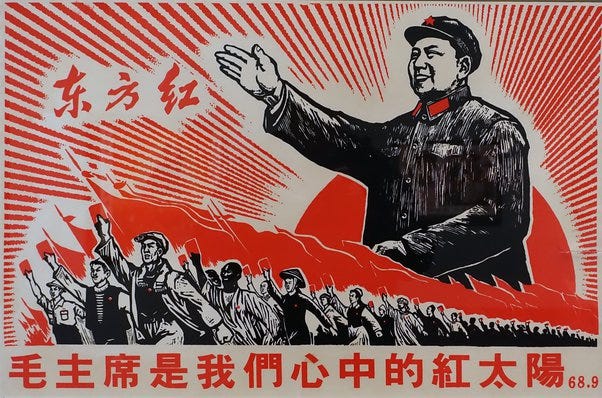In addition to all of the fun we’re all having with a potential nuclear war between NATO and Russia and a potential Third World War being triggered by the Israel and Hamas conflict, a lot of smart people are thinking that China might shoot their shot in 2024 and go for Taiwan.

There are multiple reasons why China might see 2024 as the ideal time to strike.
Taiwan and the United States will be holding elections;
America’s military already has a huge number of military commitments around the world,
and has a major recruitment problems,
and is facing a munitions shortage, especially mortar shells, having sent so much of our stock to Ukraine.
The world’s leading scholar on Offensive Realism, John Mearsheimer, has been predicting a US-China conflict for some time, as the relative power balance between The Dragon and The Eagle gets closer to one another as China ascends and America’s economic strength ebbs due to inflation and debt.
Taiwan is not only important to the CCP as a symbol of reunification, it’s also home to the Taiwan Semiconductor Manufacturing Company (TSMC). Global supply chain disruptions that began during the pandemic still persist, and the economic impact from a lack of access to chips has been driving up the price of everything that has electronic components, from microwaves to automobiles. According to Time:
For the past half-decade, TSMC has been the world’s leader, its engineers pioneering secret methods to pattern chips with unprecedented accuracy at unparalleled scale. TSMC has around 55% of the global market for contract chip fabrication, far above OPEC’s 40% market share for oil. And unlike the oil market, where each barrel is more or less the same, there are vast differences between types of chip. Taiwan produces almost all the most advanced processors, a market position that makes Saudi Arabia’s 12% share of global oil production look unimpressive.
Speculation is that a Chinese invasion of Taiwan and the potential capture of the TSMC are behind the recently passed, bipartisan 2022 CHIPS and Science Act. Rep. Michael McCaul, the top Republican on the House Foreign Affairs Committee, said, “I’ve got a unique insight in this. I get the classified briefing. Not all these members do,…This is vitally important for our national security.”
Here is the DOD’s thorough public analysis of current Chinese military capabilities, and here is the Atlantic Council’s analysis of what a Chinese blockade strategy might look like once China decides to move.
Should this conflict come to pass, here’s what you need to know …
History 1839-1949
Beginning with the reign of Emperor Qin Shi Huang in 221 BC, and prior to age of Western Global Empires, China was frequently the most dominant power in Asia. The Qing Dynasty were the final royal rulers of China, but their reign came to an end in the 1911 Revolution after a series of conflicts with outside nations. While the full history of China is beyond the scope of this article, there are a few major events from China’s more recent history that need to be pointed out to explain China’s new imperial ambitions:
The Opium Wars (First Opium War 1839-1842, Second Opium War 1856-1860)
The Boxer Rebellion (1900)
British rule of Hong Kong (1839-1997)
The Century of Humiliation (1839-1949)
Kaufmann (2011) has Five Points that are central to understanding the conflict:
First, the “Century of Humiliation” – a period between 1839 and 1949 when China’s government lost control over large portions of its territory at the hands of foreigners – is a key element of modern China’s founding narrative.
Second, the Century of Humiliation is thought by many Chinese today to provide historical lessons that are taken as indicative of how strong Western powers tend to behave toward China.
Third, the intellectual debates about the nature of international relations that took place during the Century of Humiliation underpin similar elite debates that are taking place in China today….
Fourth, although the PRC government maintains that the Century of Humiliation ended when the CCP won the Chinese civil war and established itself as the ruling regime, there remain several vestiges of that period that, in the minds of many Chinese, must be rectified before China’s recovery will be considered complete…
Fifth, there is significant lack of consensus among present-day Chinese elites about what the lessons learned from the Century of Humiliation mean for China’s future trajectory in the global arena…
History 1949 - Present

Chairman Mao, History’s Gold Medalist for Murder (Stalin gets the Silver, Hitler the Bronze), and the Chinese Communist Party (CCP) took over China in 1949, which resulted in the Republic of China (ROC) government fleeing to Taiwan and building a liberal, capitalist democracy. Both governments then claimed to be the legitimate rulers of greater China, while the CCP and the United States became locked into a conflictual relationship within the greater shadow of the US-Russian Cold War that became hot in both Korea and Viet Nam.
And, like Russia, China under the CCP followed the United States lead in developing atomic weapons, becoming the fifth nuclear power in 1964.
But unlike Russia and the US, who have negotiated and signed numerous nuclear deals with one another, China is still not a signatory to any nuclear arms reduction treaties, even though they currently have ~500 warheads and support North Korea’s nuclear program.
Meanwhile, Taiwan kinda, sorta says that they’re an independent nation; China maintains they’re absolutely not; and the US officially says both at the same time; setting the stage for a probable conflict in 2024 as the CCP sets out to complete the project of building a Unified China
From the Council on Foreign Relations:
Taiwan has been governed independently of China since 1949, but Beijing views the island as part of its territory. Beijing has vowed to eventually “unify” Taiwan with the mainland, using force if necessary.
Tensions are rising. Taiwanese President Tsai Ing-wen, whose party platform favors independence, has rebuked Beijing’s efforts to undermine democracy. Beijing has ramped up political and military pressure on Taipei.
Some analysts fear the United States and China could go to war over Taiwan. U.S. House Speaker Nancy Pelosi’s trip to the island in 2022 heightened tensions between the countries.
Religious Differences - Buddhism, Daoism, and Confucianism ≠ Judaism, Christianity, and Islam.
While the Russia-Ukraine conflict is about Christianity vs. Secularism and Israel-Hamas is about Judaism vs. Sunni Islam, China vs. Taiwan needs to be understood from the Eastern approach to spirituality, which rests on a very different foundation than the Western concept of good vs. evil.
Specifically, Eastern religions are about harmony and balance, yin and yang, order and flow, inner exploration instead of outward moral codes.

Dao means ‘way’ or ‘path.’ The Dao of Daoism is like the rhythm of a perfect day that just comes together effortlessly. It’s like how time just flies when you’re with people you love - no planning, no control, just everyone being in the moment. But the Dao of Confucianism is like the harmony of a major symphony - it emerges because dozens of people each do their part at exactly the right right time in exactly the right rhythm. In the movie ‘Confucius’ (whose real name was Kong Qui), we see this excellent exchange between Confucius and Lao-Tzu (or Laozi) begins at 2:09, demonstrating the differences in approaches to following the Dao better through inaction (Lao-Tzu) or action (Confucius):
While it’s true that the CCP under Mao tried to destroy China’s Confucian heritage as part of the Four Olds (Old Ideas, Old Customs, Old Habits, and Old Habits of Mind), this fundamental religious view of reality still shapes Chinese perceptions in a variety of ways. The Economist had a piece on how the CCP came to re-adopt Confucianism into China’s institutions.

New Ways to Wage War
The war between China and Taiwan, and between China and the world more generally, won’t just be a kinetic war. Going all the way back to Sun-Tzu’s The Art of War, Chinese military leaders have understood how critical it is to wage unconventional warfare. In addition to building islands, stealing intellectual property, and antagonizing Taiwan to test their defenses, China has been engaging in numerous 5th Generation political activities to maximize their chances should a regional or global war emerge from their attempt to conquer Taiwan:
Confucian Institutes - 160 nations around the world promote Chinese language and culture, and are thought to be influencing universities via donations.
Multiple professors have recently been caught selling secrets to the CCP.
Maximizing influence in order to gain cnotrol of global governing institutions like the United Nations and the World Health Organization.
Attempting to control online information around the world. Beyond the Great Firewall of China, the CCP has been seeking more and more control of the global internet.
Expanding their reach into Africa to secure access to resources, which some have called ‘colonization.’
Possibly sending military personnel across the US Southern border among the thousands of Chinese undocumented immigrants.
Stationing police in the United States and military in Canada.
Spying on people through its connections with Big Tech, especially with the TikTok app. The CCP-backed TikTok is very different for Chinese children than it is for their American counterparts. TikTok’s influence on our youth is big. According to Sky News, “The social media app is becoming one of the fastest-growing social networks and is used by 44% of 18-24-year-olds for any purpose and by 20% for news.”
That spy balloon.
Buying important infrastructure around the world, like European ports, French farlmand, and American farmland around sensitive sites.
Together, these give the CCP a 5 Elements-Model of Destruction to dampen and undermine any Western attempts to interfere with their plans to finally reunify China. And then maybe Japan, the Phillipines, and Australia.


